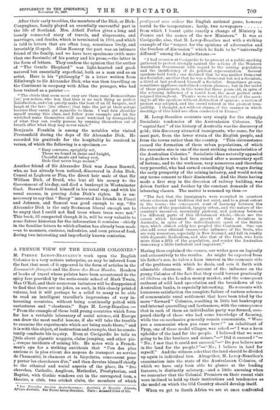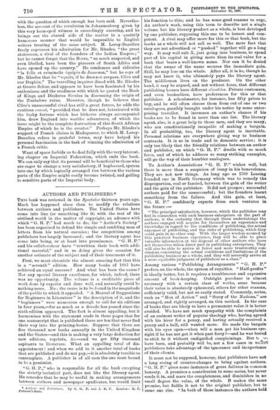A FRENCH VIEW OF THE ENGLISH COLONIES.*
M. PIERRE LEROY-BEA.ULIEU'El work upon the English Colonies is a very serious enterprise, as may be inferred from the fact that most of it appeared in the form of articles in the .8conomiste francais and the Revue des Deux blondes. Readers of books of travel whose palates have been accustomed to the spicy fare provided by the serio-comic school of Mark Twain, Max O'Rell, and their numerous imitators will be disappointed to find that there are no jokes, as such, in this closely printed volume, but it will perhaps be a relief to many to be able to read an intelligent traveller's impressions of very in- teresting countries, without being continually pelted with caricatures and " chestnuts." Says M. Leroy-Beaulieu :- " From the example of these bold young countries which form for her a veritable laboratory of social science, old Europe can draw the most useful lessons, if she will take the trouble to examine the experiments which are being made there;" and it is with this object, of instruction and example, that he consis- tently conducts his inquiry. Even at Coolgardie he tells us little about gigantic nuggets, claim-jumping, and other pie-
Aresque incidents of mining life. He notes with a French- man's eye for a striking antithesis that " l'un des plus anciens et le plus recent des moyens de transport an service de l'humanite, le chameau et la bicyclette, concourent pour y porter les chercheurs d'or," and then devotes himself chiefly to the ethnical and social aspects of the place, its " five churches, Catholic, Anglican, Methodist, Presbyterian, and Baptist, with Gothic windows cat in the corrugated iron, a theatre, a club, two cricket clubs, the members of which
• Les Nouvelles Societts Anglo-Sazonnes Australia et Nouvelle Zetande, Afrique Amtrak, Par Pierre Leroy-Beaulieu. Paris ; Armand Celia et Ole.
pratiquent avec ardeur the English national game, however
torrid be the temperature ; lastly, two newspapers from which I learnt quite exactly a change of Ministry in France and the names of the new Ministers." It was at Coolgardie, also, that M. Leroy-Beaulieu met with a striking example of the "respect for the opinions of adversaries and
the freedom of discussion " which he finds to be " universally diffused" among the Anglo-Saxons :-
" I had occasion at Coolgardie to be present at a public meeting gathered to protest strongly against the actions of the Western Australian Government with regard to the mining population and the insufficiency of its political representation. Several speakers held forth ; one declared that ho was neither Democrat nor Socialist; another that he was a Democrat but not a Socialist; a third at last professed himself a Socialist. Sometimes groans, sometimes applause, underlined certain phrases ; but in the midst of these gold-miners, in this town but three years old, in spite of the relaxing influence of a torrid heat, the most perfect order reigned throughout. Thanks were voted at the end of the meet- ing to all the speakers without distinction of opinion ; a motion of protest was adopted, and the crowd retired in the greatest tran- quillity. I thought, not without shame, of the manner in which meetings of this kind are often conducted in France."
M. Leroy-Beaulieu accounts very simply for the strongly Socialistic tendencies of the Australasian Colonies. The " capital fact" of the history of Australia was the discovery of gold ; this discovery attracted immigrants, who came, for the most part, from the lower strata of the English people, and from the towns rather than the country. " This circumstance caused the formation of these urban populations, of which the excessive size is one of the most striking characteristics of the Australian Colonies." Socialistic ideas naturally appealed to gold-seekers who had been ruined after a momentary spell of fortune, and to the workmen, very numerous and therefore very powerful, who had earned exceedingly high wages during the early prosperity of the mining industry, and would not on any terms consent to their diminution. And the State having made a first step in the direction of railway building, was driven further and further by the constant demands of the labouring classes. The matter is summed up thus :—
" The fact that the immigrants were recruited in quarters where cohesion and tradition did not exist, and to a great extent in the towns : the consequent -want of harmony between the character of the population, largely urban, and the nature of tho country's resources, essentially pastoral, and jealousy between the different parts of this ill-balanced whole,—these are tho causes which favoured the growth of State Socialism in Australia, in spite of the individualistic spirit of the British race, which almost solely has peopled this Continent. One can also add some ethnical eauses,—the influence of the Scots, who are very numerous, especially in New Zealand, and fall in readily with dogmatic Radicalism, and also that of the Irish, who form more than a fifth of the population, and render the Australian democracy a little turbulent and impatient."
Having thus explained the causes, our writer goes on logically and exhaustively to the results. As might be expected from his father's son, he takes a keen interest in the economic side of the problems with which ho deals, and sets it forth with admirable clearness. His account of the influence on the young Colonies of the fact that they could borrow practically ad libitum on the London money market, and the consequent outburst of wild land speculation and the breakdown of the Australian banks, is especially interesting. He recounts with humorous satisfaction the complete failure of various schemes of communistic rural settlement that have been tried by the more "forward" Colonies, resulting in little but bankruptcy and internal quarrelling and lawlessness, with the consequence that in each of them an individualist party was formed, com- posed chiefly of those who had some knowledge of farming, while the ex-mechanics generally remain communists. " Were you a communist when you came here ? " an inhabitant of Pyap, one of these model villages, was asked.—" I was a keen upholder of the land for the people. I believed that we were going to be like brothers and sisters."—" Did it succeed ? "- " No ; I saw that it could not succeed."—" Do you believe now in the land for the people ?"—" No ; I believe in land for myself." And the witness asks that the land should be divided up again in individual lots. Altogether, M. Leroy-Beanlien's examination into the state of the Australasian Colonies, of which we have only been able to glance at the leading features, is distinctly salutary,—and a little amusing when we remember that the Colonial Premiers on their recent visit
were inclined to hold up their institutions and tendencies as the model on which the Old Country should develop itself.
When we get to South Africa we are at once confronted with the question of which enough has been said. Neverthe- less, the account of the revolution in Johannesburg given by this very keen-eyed witness is exceedingly amusing, and he brings out the absurd side of the matter in a quaintly humorous manner that would be impossible to English writers treating of the same subject. M. Leroy-Beaulieu freely expresses his admiration for Mr. Rhodes, "the great statesman, a rival of the founders of the Indian Empire ; " but he cannot forget that the Boers, " so much suspected, and even libelled, have been the pioneers of South Africa and have opened up the country." He condemns and ridicules " la folic et criminelle equipee de Jameson," but he says of Mr. Rhodes that he "equals, if he does not surpass, Clive and our Dupleix." The travelling inquirer dined with Mr. Rhodes at Groote Schur, and appears to have been fascinated by his enthusiasm and the readiness with which he quoted the Book of Kings and Diodorus Siculus in discussing the origin of the Zimbabwe ruins. However, though he believes that Clive's unsuccessful rival has still a great future, he adds the cautious caveat, "provided that he does not, intoxicated with the lucky fortune which has hitherto always accompanied him, draw England into warlike adventures, of which the issue might be the complete destruction of this South African Empire of which he is the creator." Perhaps Mr. Rhodes's support of French claims in Madagascar, to which M. Leroy- Beaulieu refers in grateful terms, may have helped his personal fascination in the task of winning the admiration of a French critic.
Want of space forbids us to deal fully with the very interest- ing chapter on Imperial Federation, which ends the book. We can only say that its perusal will be beneficial to those who are eager to change a very satisfactory, if haphazard, system into one by which logically arranged ties between the various parts of the Empire might easily become twisted, and galling to sensitive parts of the Imperial body.























































 Previous page
Previous page